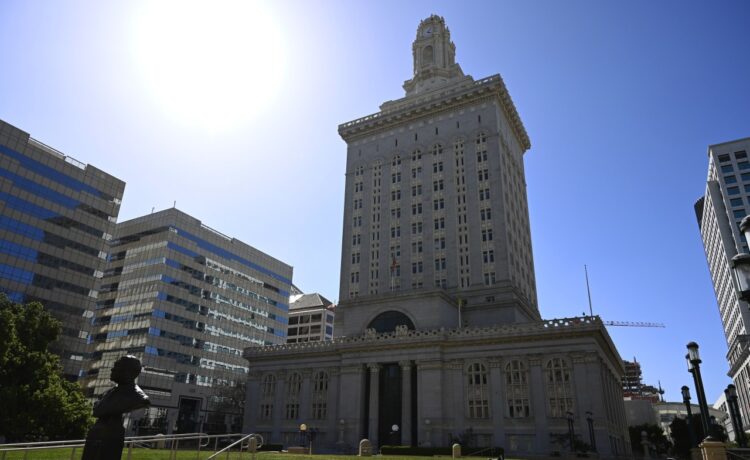(BCN) — The Oakland City Council held its collective nose and voted to approve a budget Tuesday that, while avoiding layoffs, also didn’t solve the city’s on-going fiscal morass.
The 5-3 vote codifies a proposal by Mayor Shang Thao, with some amendments from councilmembers, to use $63 million from the anticipated $105 million sale of the city’s ownership stake in the Oakland Coliseum to help close an estimated $117 million shortfall.
The vote staves off painful service and program cuts for at least another year.
If the sale doesn’t go through or if the city doesn’t receive its first payment from the buyers, the African American Sports and Entertainment Group, by Sept. 1 then a “contingency” budget featuring $63 million in cuts to city services kicks in.
Councilmember Dan Kalb said the Council was facing a variety of “unpleasant options” and that “no budget has zero risks,” before casting a vote in favor of the proposal.
“I believe this budget does the best we can,” Kalb said. “I believe the Coliseum sale will go through.”
In addition to the one-time Coliseum windfall, the budget uses roughly $20 million in new business tax revenue — as authorized by last year’s Measure T business tax increase — and an estimated $20.5 million increase in real estate sales tax increases to balance the books.
It also leaves roughly 300 un-filled city jobs vacant, which will save about $133 million over the next two years.
The spending plan includes funding for 678 police officers — there are currently 712 — three police academies, $36.5 million in police overtime and no reductions in fire department services.
The staffing-level decrease would happen without layoffs, as employees retired or quit.
Thao praised the vote, saying it’s a fiscally responsible budget that preserves vital city services.
“We must remain disciplined and address our deficit responsibly while maintaining our focus on the issues that matter most to Oaklanders, public safety and clean streets,” Thao said. “This budget achieves that goal.”
Kalb, along with councilmembers Rebecca Kaplan, Kevin Jenkins, Carroll Fife and Council President Nikki Fortunato Bas voted to approve the plan.
Voting against were Councilmembers Treva Reid, Noel Gallo and Janani Ramachandran.
The Council selected from between two budget plans Tuesday, one of which included money from the Coliseum sale and one that didn’t.
The one that didn’t featured $63 million in immediate cuts — which could be restored if the sale goes through — including temporary closure of four fire stations, the elimination of two police academies and funding for 610 police officers.
Ramachandran said she and her colleagues didn’t have enough time to offer amendments and get questions answered from the city’s finance department and called the budget process an insult to Oakland residents.
“I am not only deeply disappointed but frankly shocked by the wildly irresponsible choice made today by the Oakland City Council to close this budget deficit with money we do not yet have,” Ramachandran said. “With the sale of the Coliseum nowhere near being finalized, incorporating $63 million into this year’s budget from a future Coliseum sale is an ill-considered risk.”
The union representing 4,000 of the city’s professional staff, the International Federation of Professional and Technical Engineers Local 21, praised the vote while acknowledging the Council had no good options.
“This went a long way to securing everything we need to do right now, a critical step we needed to take, with no easy options in putting together a sound public safety approach,” said IFPTE Local 21 President Julian Ware.
Another of the city’s unions, however, the Oakland Police Officers’ Association, lambasted the plan and called it dangerous.
“The city budget relies on the controversial and doubtful sale of the Oakland Coliseum,” OPOA President Vice President Tim Dolan said. “Yet, there has been no RFP for the sale of public property, no good faith money nor any indication that the buyers can complete the deal. The city just bought a pig in poke.”
The approved plan is technically a mid-cycle adjustment to the current 2023-2025 city budget of $4.2 billion, for which there exists an on-going $100 million “structural deficit.”
That deficit, which needs to be closed during next year’s budget negotiations, has been created over several years, partly by reliance on overly optimistic economic forecasts and by spending one-time funds — like federal COVID-19 pandemic aid — on on-going expenses.
Prior to the vote Tuesday, the city’s budget administrator Bradley Johnson told the council that it will likely be impossible to close that spending gap without cuts Oakland’s two largest departments — police and fire.
Copyright © 2024 Bay City News, Inc.















